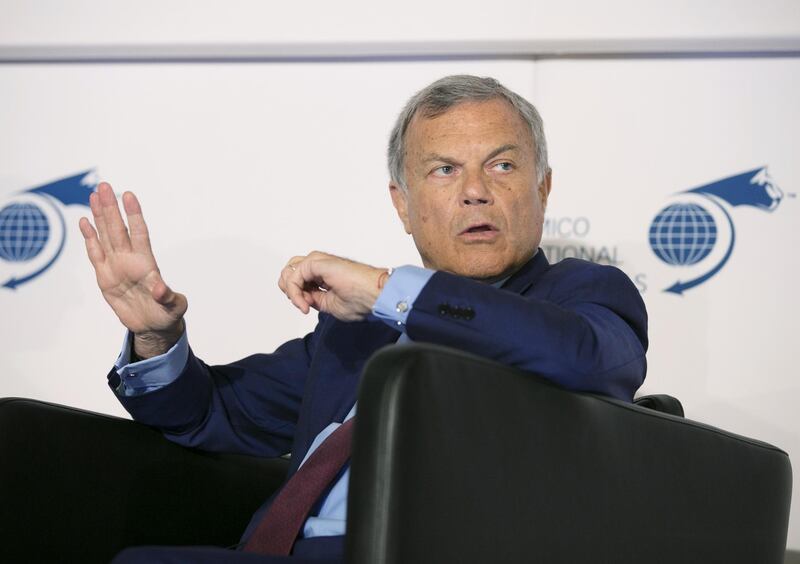He was knighted by the Queen, an ambassador for the Davos set and a titan of advertising who had transformed his small company into a worldbeater. Scandalous revelations surrounding the circumstances of Martin Sorrell’s sudden resignation in April this year, sharply divided the once loyal shareholder base of his former company, WPP.
In a low-celing room on London’s south bank of the river Thames on Wednesday, the board saw off a rebellion from the shareholders with many of those gathered expressing mixed views of the man who had overseen the company’s stratospheric rise to become the biggest player in advertising.
Almost 30 per cent of WPP shareholders voted on Wednesday against a £19 million future share awards package Mr Sorrell was entitled to due to the allegations.
One shareholder, who asked not to be named, owned stakes in WPP for five years. “I’m not happy with the payment to him, he’s not short on money,” he said. “If the allegations are true then that is full on fraud which is why I think he’s gone quietly. He’s damaged goods, his reputation is in tatters so I think he will have a problem setting up a rival company.”
Earlier this week Mr Sorrell was forced to deny allegations that he had harassed colleagues and misused company money which included an alleged visit to a brothel. The Financial Times interviewed some 25 former co-workers who claimed the ex-CEO had verbally abused assistants.Mr Sorrell denied the allegations.
Executive Chairman Roberto Quarta refused to answer a stream of questions over the “robust” WPP investigation, citing “unequivocal” legal advice and data laws.
______________
Read more:
[ Martin Sorrell quits as head of WPP advertising agency ]
[ WPP's Sorrell accused of personal misconduct ]
______________
Mr Quarta conceded an investigation did not establish grounds to remove the bonus package, even though the allegations led to Mr Sorrell’s departure.
“[The contract] required Martin to be treated as retired unless a definition of gross misconduct could be satisfied, which it could not,” Mr Quarta said.
“There is really and simply nothing further we can legally disclose.”
He said the package Mr Sorrell was entitled to would have been severed had the former chief executive been found guilt of gross misconduct – a charge found to be untrue.
Nonetheless, shareholders made clear their unhappiness at the way WPP had handled the investigation with some 17 per cent voting against Mr Qaurta’s re-election as chairman. Mr Quarta joined the company with a reputation as a cost-cutting executive in 2014 as part of succession planning surrounding Mr Sorrell, 73.
WPP was a small manufacturing company when Mr Sorrell joined in 1985, going on to make a welter of acquisitions around the globe.
Some shareholders had called for a rejection of Mr Sorrell’s retirement package and attacked Mr Qaurta’s chairmanship over the investigation's lack of transparency. Many small stakeholders said they were bewildered over the events, with one commenting that “she simply had no idea what was going on.”
While Mr Qaurta made clear that WPP believed all employees were entitled to be treated with the “utmost respect”, some felt the recriminations against Mr Sorrell were too strong.
“The fact he could have taken the money for that purpose shows that he is no longer fit to run the company with that level of judgement,” said a shareholder who had a small stake for three years.
Nonetheless, some praised the work of Mr Sorrell with one shareholder commenting that “it was disappointing there was no tribute to Mr Sorrell.” Another, who gave his name only as Clive, said that amongst the allegations, it should not be forgotten the work Mr Sorrell had done in forging WPP’s path forward.
But the frustrations did not simply end. One shareholder questioned whether Mr Sorrell's decision to launch a potential competitor amount to gross misconduct with his new venture S4 capital. Another said that, after a difficult year, he feared a further reduction in dividends considering the former CEO’s expertise. Mr Quarta laughed of the suggestions, comparing S4 capital as a peanut that could not compete against the giant of WPP.
Attention will now move to Mr Sorrell’s successor as one attendee questioned WPP’s future direction given how “key” and “crucial” he had been. Interim co-CEO Mark Read told the AGM that WPP would succeed without his predecessor but needed to simplify the way it worked.







